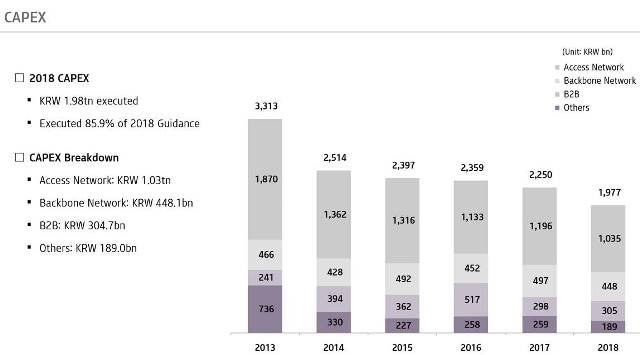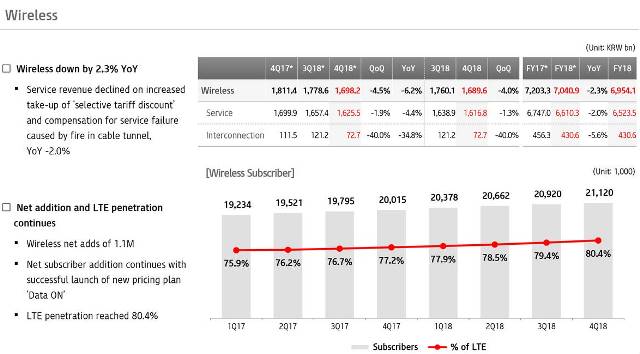KT Corporation CFO Kyung-keun Yoon didn’t reveal the company’s Capex for 2019 in the wake of uncertainties around 5G investments.
 Capex spend of KT in 2018 had reached KRW1.98 trillion against the previous guidance of KRW2.3 trillion. The company said it could lower the investment due to efficiency measure in the last 12 months. KT’s head of network group is Seong Mok Oh.
Capex spend of KT in 2018 had reached KRW1.98 trillion against the previous guidance of KRW2.3 trillion. The company said it could lower the investment due to efficiency measure in the last 12 months. KT’s head of network group is Seong Mok Oh.
KT spent KRW1.03 trillion towards access network, KRW448.1 billion on backbone network, KRW304.7 billion for B2B services and KRW189 billion on other areas in 2018. The latest KT report on quarterly earnings shows that its Capex in 2017 was KRW2250 trillion and KRW2359 trillion in 2016.
“On the investment plan, we will communicate once uncertainties around 5G investments are removed,” KT CFO Kyung-keun Yoon said.

KT is marking the beginning of 5G services. KT was the first in the world to showcase 5G services at the PyeongChang Winter Olympics on February the 2018. With the start of 5G frequency transmission last December, commercialization will come under full swing from March, starting with metropolitan areas and major cities.
KT has created the largest and most optimal 5G frequency bandwidth, together with fixed-line infrastructure it will utilize edge cloud center located nationwide to provide Korea’s best quality 5G services.
KT deployed the first phase of its 5G network in November last year. The new service has begun in the greater Seoul metropolitan area, major metropolitan cities outside Seoul and in isolated areas including Jeju, Ulleung and Dok islands.
KT will expand its nationwide 5G network to 24 major cities, key transport routes such as expressways, subways, high-speed railways, large universities and neighborhood shopping areas.
KT will focus on the development of five key areas: smart cities, smart factories, connected cars, 5G media and the 5G cloud. Samsung, Hyundai Mobis, Posco, Intel, Ericsson, Nvidia and Qualcomm are some of the partners of KT.
KT revenue
KT has reported revenue of KRW23.8 trillion (+1.6 percent) in 2018 with operating income of KRW1.2 trillion (–11.4 percent), net income of KRW715.1 billion (+27.3 percent) with EBITDA of KRW4.5 billion (–5.1 percent). KT’s operating cost increased 2.4 percent to KRW22.5 trillion.
KT has generated KRW740.9 trillion (–2.3 percent) from wireless, KRW4,799 trillion (–1.2 percent) from fixed line, KRW2,449.2 billion (+9.4 percent) from media and content business.
Baburajan K
